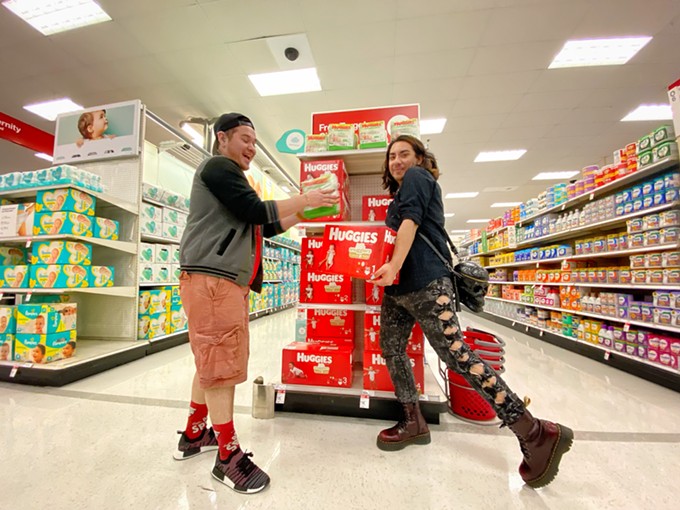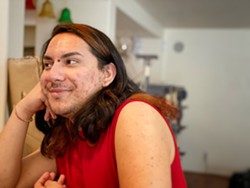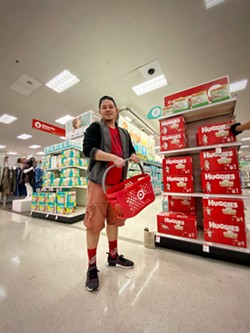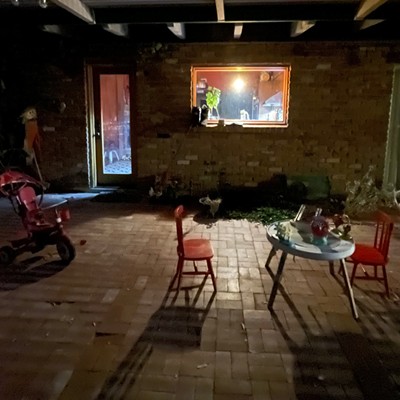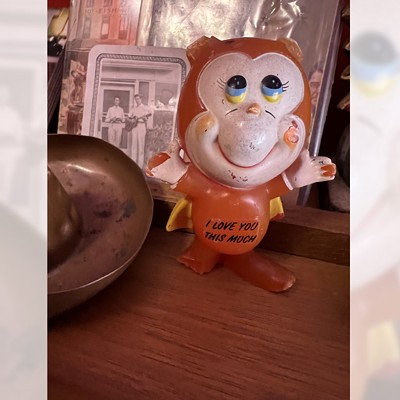Cain's story was first about how a teen California girl named Emily transitioned to boy named Cain. How he graduated high school, and entered college at the Art Institute of California and took the first hormone shot, in the same week, at 17 years old. I first wrote of Cain in these pages back in July 2018. How parental white noise yielded to acceptance. How little take-for-granteds turned huge—from pissing in the boy's bathroom to widespread schoolyard intolerance. How the huge became take-for-granteds—from depression and suicide attempts, to therapy and gnarly happy pills, to the absolute terror inside the confusion inside a teen grappling with shifting identity. He talked freely of a time back when Obama was just getting elected, when most of his peers were traversing the wild-heart bumps of puberty, his grueling evolution from girl to boy was as much about sacrifice and self-love as it was pure hatred of self.
Over the years, the hormone injections had lowered Cain's voice to a pleasing baritone, and his chin beard continues to highlight flagrant brown eyes; his Samurai hair, with shorn sides and ponytail, is gone. Strands now favor a buzz cut. He couldn't afford more hormone injections so his menstrual cycle had returned. He'd given up the meth, but not the vape and the drink.
He talked of not remembering much of being a girl, only the life-threatening depression and anxiety. The childhood memories had mostly vanished. He remembers his sisters and two brothers, his parents splitting up, and the shitty step-dad, of course, and hardly even a Christmas. At 19 the medical diagnosis came back: bi-polar, with severe depression and anxiety.
He talked how testosterone makes the clitoris bigger, ready to penetrate, how his measured four inches when he was on hormones. In that story too was Cain's then-boyfriend—a pageant drag queen. But they split up last year after Cain lost his job at the shoe store and financial calamity ensued, the eviction from their crappy eastside apartment, the repossessed car, the loss of everything. The deal with his unemployed boyfriend became a one-sided cheat-fest, saw Cain force-fed an open relationship, which preceded the ugly split. Bread-winner Cain suffered abuse. But at least in that way he was honoring his past relationships. At least in that way he found female trans Frida Lucia, who slipped into Cain's life just before his breakup. The 22-year-old is mother to his forthcoming child, with which Cain is pregnant.
* * *
Frida is in the kitchen making coffee. No coffee for Cain; only decaf now, which he considers a crime against humanity, but oh well. He no longer smokes, drinks, drugs, vapes, or ingests a smorgasbord of anti-depressants.
Cain leans against a kitchen countertop, wearing sweats and a gray flannel shirt over a red tee. His CBR septum piercing twinkles off Saturday morning light.
"Everything changed overnight," he says. "And I never thought I could get pregnant. I'd been on hormones for years. We stopped using protection in my last relationship, and nothing. So, by my calculations, within two weeks of not using condoms, I was knocked up."
They are in the house they share with roommates, including another trans couple. All are out today. It is a nice, orderly suburban house, one of those faux-stuccos arranged in perfect symmetry out near the airport; granite counters, a raised hot-tub out back, a mad-decorated 10-foot Christmas tree that bends to accommodate the ceiling. Upstairs bedrooms, clean carpet, pricey Amazon-purchased furnishings, which Cain and Frida have been piecing together of late, and six buddha cats and a dog, all of whose odors are miraculously undetectable.
The cozy housing is only temporary, and their belongings are few. In two months, they'll move a few miles away to live with Frida's father.
To put a spin on this house and Cain's pregnancy, one roommate, a non-binary trans person, found out they were pregnant within a day of Cain and Frida's discovery.
"It was one day apart," Frida laughs.
Cain adds, "How dare they steal our thunder!"
The couple have just walked in from an ultrasound appointment, using a borrowed car, and Cain produces his phone to show a video of the event. They take turns pointing out heartbeats, the tiny head, the tiny being growing inside of him. Cain nods at Frida, says, "She had me cracking up during the ultrasound. The nurse had to take the wand off of me."
"The baby had the hiccups," she says. "I love that!"
Cain's joy elevates to a what-the-fuck moment: "It went from a dot on the screen to a little human! I don't feel any more girlish. I don't feel any more feminine. How can I be pregnant?"
The realization of the seriousness of an actual pregnancy suddenly pilots the mood. Here, in this moment, is the fleeting beauty of a hopeful life transcending the process and reality; good outweighs the bad, yet the bad is big, and not lost on the couple.
A pregnant man is a mighty tough sell. Even the little things. The whispers in the maternity store, the frightened expressions on small boys at Target, judgment in hospitals. But it is not like they aren't used to this stuff.
Cain's shrink thought he should be committed, thought he made the pregnancy up. Back in November they strolled into a hospital ER to confirm the home pregnancy test was accurate and were met with double-take bafflement, this male voice with beard and girth saying he was pregnant.
"I walked up and the woman ER clerks said, 'What brings you in today? I said, 'I just took a pregnancy test and it was positive. I don't know what to do."
The woman quieted, turned her head, and laughed in disbelief.
A male nurse entered and the clerk informed him this boy is pregnant.
The nurse didn't want to touch Cain. "They probably wanted to run me straight to a psych eval," Cain laughs, as if to say the obliqueness should not be too difficult to unravel. "But," he adds, "I understand the guy didn't know what to do."
Frida says, "But it's the women who are accepting and kind."
The couple discovered he was pregnant on Thanksgiving; the day Frida was to meet Cain's mother in central Arizona. "I said to Frida, 'Are you ready to have the worst Thanksgiving ever?'" Their laughs fill the room.
This is hardly some goofy Ivan Reitman rom-com in which Arnold Schwarzenegger becomes pregnant. Oh, having a baby is just so terrible, and there is no man who could endure childbirth agonies, much less the brutal, beautiful pangs of womanhood. The joke was on the movie.
* * *
Cain is emotionally and intellectually intelligent, curious and well-read. "Always was," his father tells me later. That combination explodes in tongue-roll sentences filled of nuanced observations of people, places and things, and the reminiscences of one who has struggled mightily with despair and identity. His thoughts unfurl in tight-lensed images and self-effacements that manage to bow-tie monologues beginning with, say, orphan cats and their filthy cat boxes only to end on an analysis of tolerance of old Mexican racists and tired white-dude homophobia. There is empathy even in his indictments of past loves and downer scenes
His is the self-reflection of memoirist searching for some semblance of confidence and meaning. How he distills unrehearsed thoughts and sentences to pithy deductions impresses.
Frida too. So similar. It's easy to see why they found each other. When smart people are marginalized, discarded and bullied, it stands to reason they eventually discover each other. (Water seeks its own level and all that.) These shared experiences, the identity and culture. They never interrupt when the other speaks and often their takes on dying things and a life filled of possibility dovetail. It's a jargon of communication befitting a couple much older in years.
Their smiles bloom inside the other. New love. Oh, there is the drama. The Tucson queer community, the late-night boozing, some backstabbing. "We are queer, after all," they laugh. Several minutes later, Cain wells up, looks to Frida and says, "I look at her and I just start crying. It happened twice today and it is not even noon."
Cain can whip out poems in a car ride that make Frida cry. Frida throws up watching Cain throw up from morning sickness. Who knows if this union will last; they both agree it must. They are a family now with marriage on the table.
Frida's distressed youthful complexion, dark shoulder-length hair and thick lips link to feminine predilections; the slightly exaggerated gait of a woman on a wily catwalk. The accuracy of a well-timed backhanded hair flip punctuates the reticence of self-reveal. She is partly shaded by a masculine view of female beauty, equal parts camp and hard-won expression—the intramural social signs of a boy transitioning to womanhood. Blatant dark eyes and a nose-bridge piercing highlight, but there is a ceaseless calm, which is not to say she isn't expressive; she is. Very much so. She radiates composed joy in conversation, in a way that suggests nothing strange has ever happened to her, yet she'll caution such composure is exterior only. She is instantly likable. Her Spanish and English are perfect.
Her self-effacement masks traumas below the surface, the obvious oppression and discrimination, the muddle of sexual-categorization, the family, from whom she was estranged for years. The mad depression. And finally, becoming a woman as a life-raft. She laughs, "I blame it all on Beyoncé!"
Sipping a coffee in the kitchen, Frida remembers to take her Zoloft, and her story emerges.
She grew up in Tucson and Mexico. Her parents separated, and dad, an El Salvadoran immigrant and roofer by trade, is her family here. Her mom, a sister, and most relatives live in Sinaloa, Mexico. She was constantly bullied as a boy, at Apollo Middle School and one year at Tucson's Sunnyside High, and she finished high school in Mexico, where it wasn't easier.
"You can imagine how a gay boy does in a small Mexican town." Her laughs turn sheepish, and she says, "I was bullied my entire life; the usual straight jocks, the girls ..."
Frida attended art school here for a spell, and she draws, sketches and paints, has since childhood. "My dad would come home with roof tiles and we would draw and paint on them." Her work (found on Instagram @fridalucia_art) often tells pisstakes on cultural signifiers, like one titled "Carnations and Blasphemy," showing a boy confused by centrist religions, his halo, the cross, the symbolic tattoos and piercings. She sews and plans to make clothes for the new arrival.
Frida found local fame as Viper, drag queen. Now a jump to see beyond the immediate: she is enrolled in student-loan funded school to study psychology, keen to become a therapist, next semester Pima Community College. She just began work at a C3 call center.
She's one year into identifying as a woman but has yet to start hormones or reassignment bottom surgery, pending a forthcoming visit to the endocrinologist. The timing of Cain's pregnancy was perfect. He was off hormones and she hadn't started yet. "It's like this baby was meant to be," Cain says.
In the meantime, Frida's dad helps the couple with rent and they receive food stamps and medical care through AHCCCS.
"No one is ever really ready to have a baby," Frida adds, her tone tempered by the rising awareness of an impending motherhood, in lieu of doom, and she's reading all she can, absorbing any information, a pragmatism new to her.
To which Cain says, "We have a lot of growth to do in six months. My first thought was, 'How am I going to take care of myself?' Well, I signed up for school to get a degree and get a job. I needed to figure out how to earn in the more socially acceptable way."
Yet Cain "lost every job I've ever had due to mental illness." His last gig, at the Red Cross call center, saw him suffer a two-hour breakdown before his first day. Was his only day there. But they refuse to raise a baby on food stamps, aren't so keen accepting them now. They are starting this life together at point zero.
"This pregnancy was the driving force in getting my shit together," Cain adds. "Absolutely. It is what happened with my mom, it happened with my dad, it happened with friends. We don't want to have to support our family on minimum wage, going from job to job to job. You can't."
Cain, who also suffers degenerative hearing loss, aided now by an in-ear amplifier, is scheduled to begin school, to earn an American Sign Language degree, in the interpreter program at Pima Community College. (His plans include parlaying the ASL degree into a journalism degree. He is a writer.) His experiences in the deaf community have lasted, to which he says, 'The deaf community is fucking beautiful, dude. I'm really excited to get into it." In Cain's brief foray as a drag king he would dress up the self-satire with sign language. "I had people coming up to me, thanking me for signing."
He may also be enrolling at the IHRSS Institute at the University of Arizona, a brief training program that will allow him to become a Healthcare Recovery Support Specialist, his history of mental illness and drugs put to a career.
They plan a move in five years to Washington, a state as permissive as it is pretty. Cain hates the dusty brown of Tucson as much as he soured on local kinship. "Now I want nothing to do with the [Tucson] drag community," he says. "I was blacklisted because of an abusive, cheating asshole. That community is full of people who cheat on each other."
Cain brackets self-image and its relation to the health of the baby, which is his priority one, and how he relaxed into this new role. "I've always struggled with my weight. In some ways this pregnancy has sort of helped my self-image. I mean, I'm gonna get big," he laughs. "I'm gonna have one big-ass beer belly, and I'm a hairy dude."
The trick for them is searching for a doctor or OB/GYN who isn't alarmist, hence the hunt for midwives who offer calm summaries, support with sensitivity toward transgender issues, to aid in pregnancy and delivery.
At the very least, one who won't consistently mess up the "he" and "she" pronouns. "You learn who to trust by how they use the pronouns," Cain says, and Frida nods.
Both sets of biological parents now want to be in Frida and Cain's child's life. A baby shower is already planned with Frida's side of the family in Mexico, and Cain is brushing up on his wonky Spanish.
"This pregnancy patched up things with her family," Cain says, reaching out to rub Frida's hand.
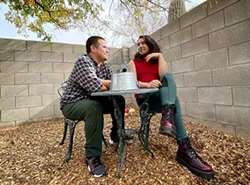
"My grandmother was excited," he continues. "She's super-Mexican. She thinks two trans parents are better than a gay couple, that juxtaposition of homophobia and her acceptance of transness." He imitates his grandma,. "Well, there is a mom and a dad.'" Their laughter echoes in the open kitchen.
They acknowledge the universe is female, "but not if you are a seahorse," Cain adds. "The males carry the baby, and the female inserts the egg. All sorts of fish transition." He adds, nodding to Frida, "She gets 20 times more excited about the ultrasounds than I do. I feel like the dad, it's just that I'm carrying the baby."
* * *
Male transgender hormone therapy means testosterone injections every two weeks, more or less, an estrogen blocker, a GnRH analogue and progestogen. Hormones deepened Cain's voice, gave him masculine facial and body hair. If he started early enough, and he is not sure, it can limit hip-widening prevention or increase height, it could never undo puberty, certainly. One needs to go under the knife for that.
If a trans man has not had a hysterectomy, which Cain obviously has not, he will regain fertility once stopping testosterone. (Cain did have a mastectomy, yet there is still about a 50-50 chance he will be able to breast or chest feed his kid.) Long-term hormone therapy may influence ovarian change but its effects on cervical tissue are largely unknown. Bone density shifts can stimulate changes in the skeleton, but the pelvis is considered unaffected by hormone treatment. No research has shown that prior use of testosterone affects pregnancy.
Cain has not had a hormone treatment in two years. Yet testosterone side-effects in general include blood thickening, cancer risk, high blood pressure etc. Cain says the alternative is "so much worse." He plans to be back on hormone treatment once the baby is born.
According to the U.S. Transgender Survey, nearly 40 percent of its 28,000 respondents of trans men who experienced pregnancy, mostly unwanted, reported attempting suicide—nine times the national average. This fact alone put Cain's pregnancy in the "high-risk" category. (Since 2015, fewer than 100 trans men have given birth yearly, worldwide.)
Dr. Justin Brandt at Rutgers University was lead author of "Transgender Men, Pregnancy, and the "New" Advanced Paternal Age: A review of the Literature Study," published July, 2019. In that he wrote how suicide risks rise sharply among trans men dealing with a pregnancy's physical changes. "The process of transitioning is long and arduous, and pregnancy, which is regarded as a feminine condition, forces these men to almost fully transition back to their sex assigned at birth, which can worsen gender dysphoria." Cain says he is ready for this.
Surveys to screen pregnant and postpartum women for depression aren't designed to assess the impact of pregnancy on gender dysphoria in trans men. Precedents are few, yet male pregnancy is gaining some mainstream attention, for example Thomas Beatie's story in The Advocate, how this transgender man bore three children, and the lauded UK documentary Seahorse, about a trans man's struggle to conceive and deliver his own child.
Really, as Cain says, medical professionals he's talked to in Tucson so far offer no answers regarding what, if any, influence his previous hormone therapy will have on his pregnancy. "They just don't really know. It's all too new."
Tests and ultrasounds show Cain's pregnancy is healthy, and he is mostly overjoyed with the prospect of it all. Mostly. His terrors revolve simply around two things: The pain of actual child birth, and passing on his mental disorders to the child. Says his insider's knowledge of depression and suicide make him better equipped to handle such in a child. Much more than his own parents were. He says, "All my mental issues? I do not want my kid going through the same thing. I have so much experience with a lot of different neuroses, so our kid will have a lot of support at home."
Frida and Cain's perspectives are refined, minds in relentless self-characterization mode, circular struggles to ease a life crammed of complications and the pressure of their own judgements.
"If you've done as much therapy as we have," Cain laughs, "the self-reflection is honed."
* * *
Cain's parents divorced when he was young, and he went to live with dad to avoid an abusive step-father. Says his dad is "awesome, I've been very privileged because my dad is white, well-educated, smart, open-minded. I had a leg up."
Cain's father, Bob Pierce, supported Cain's transition, and now the pregnancy. "My other kids took the pregnancy news fine," he says over the line from his Southern California home. "We all kind of had the same reaction: "oh, really! They're actually excited. And I remember having to explain to them that Emily is not Emily, he is Cain. They never had a problem with it."
Cain's transition wasn't so easy for dad, at first, and there was little outside support then. "I don't know that there was any preparation for it," Bob says. "It was hard. The lady I was married to at the time came from a different place and so I was being pulled in different directions. The turning point was when Cain was around seventh grade. We were at the mall and Emily only wanted to buy boy's clothes. I got mad and stormed off. Then I sat there and thought, 'What the fuck am I doing? This is my child.' That was a turning point. So, I told Cain, 'You be you, I'll support you.' That was it. I grew up in Long Beach in a time when it was not even accepted for gays to come out yet."
Says he was never ashamed or embarrassed by his child's teen transition, and now the pregnancy. "I was more afraid for him."
Bob accompanied teen Cain on visits to necessary doctors for the transition and hormone therapy. Once Cain completed gender counseling (because he was under 18), dad and therapist signed off so he could start hormones. Cain studied video game design in college. A year later he followed a girlfriend to Phoenix where he was "literally raped and tortured." Got into smoking meth. The next partner gave him a black eye and emotional trauma left him unable to speak.
He left Phoenix for Tucson, worked a series of low jobs.
In the meantime, Bob's own demons headlocked him. "I was off the deep end with my own addictions. It was an awful time for it to happen. My whole thing started when I got a giant check, $400,000. Somebody said, 'Hey, you want a bump of this?' It was meth. That was it. I just checked out. I had children, a baby at home. I burned through money, I lost my law practice and got disbarred."
Dad is 100 percent sober now, and he works in a refinery, which, he says, "is way more suited for me. I had a mental change. I have dreams. And then when I found out Cain started doing meth, I was heartbroken."
It is easy to hear regrets weigh on the father, who says he wishes his sobriety began 30 years ago. "That would've changed the trajectory of everything. I can't go back to change anything now. I regret that I started using meth. Cain was 15 when I started. I had a 3-month-old. My kids ... it was the biggest disconnect. Now I wish he was able to live close, so I could help with the baby."
Cain is lax to call dad for cash, he's reluctant to accept help from anyone.
"He knows he can call me if needs something," Pierce says. "I was sad he didn't call me when he couldn't afford the testosterone. But he is really good at calling me when he needs my advice. I give him his space. Being with Frida has helped. Who knows if they will work out, maybe not. I hope it does. If it doesn't, I hope they can stay friends."
Adds, "I know I'm not unique in my accepting of all of this, but it's different in a Mexican culture, and I'm not sure how Frida's side of the family is dealing with this."
* * *
Several days later Frida and Cain are shopping for baby supplies at Target. The baby and maternity aisles get you: the fuzzy pinks, the rosy glows, the onesies with striped elephants, preening baby faces on boxes of Pampers. It is adult appeal, and perfectly fine for a couple of young queers having a baby, each with an eyebrow raised.
"Oh, this is so perfect," Frida says. "OK if we get this?"
Cain nods and picks organic Gerber mittens. "Is this OK?
Frida: "Oh, that's perfect."
In this interpretation, a Target store has a miraculous way of normalizing gender, birth, parental identities. It is oddly inclusive for an American store chain; the colors are the same either way. Hanging around this couple, these large personalities—externally revealed today in Frida's long sapphire fingernails and black skull purse and Cain's backward trucker hat, burgeoning hairy belly—it doesn't feel incongruous strolling the dense, vaguely perfumed air inside the hyper-consumer Target, everything colored with an optimistic freedom that doesn't seem real.
Cain, looking through pricy nanny cams and baby security cameras, says, "Advertising will teach you to become the worst parent in the world. This should be intuitive."
While their collective manner of self-expression is often wrapped in buzzy, ostentatious displays of queer pride, the sense is they are seeking a socially acceptable version of a normal, even quiet, life. Like shopping for baby supplies at Target. Perhaps integration minus the bells and whistles of community pride? Cain isn't so sure. Their world is winnowed around them. He wants others to benefit.
"I tend to be aggressively trans," he says.
That is true, I've seen him hit a Circle K in a mesh crop top, booty shorts and kohl eyes. "People who are radical are important to those who haven't come out of the closet," he adds. "It makes life easier for them. My favorite way to come out to people is with humor. I'm OK with who I am."
Frida eyes baby-care grooming sets as Cain recalls new parents coming into the shoe store he managed, dropping $70 on a tiny pairs of shoes the babies would only ever wear once, for a photo.
"There is a lot in our culture of treating babies like accessories," Cain says. "I'm not going to have a baby to post on Instagram just so I can become an Instagram dad." He pauses, adds, "don't get me wrong, our baby will look great."
And the baby itself? Frida would like a girl. Cain, maybe a boy, but he doesn't care so much.
"We're so open about gender expression," Cain says, "So it really doesn't matter."
Frida adds, "If it's a boy and he wants to be a princess, that would be great too."
Brian Smith's collection of essays and stories, Tucson Salvage: Tales and Recollections of La Frontera, based on this column, is available now on Eyewear Press UK. Buy the collection in Tucson at Antigone Books, 411 N. Fourth Ave.

